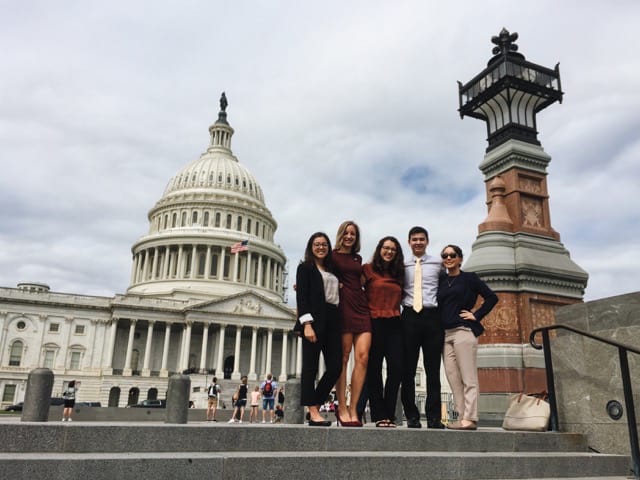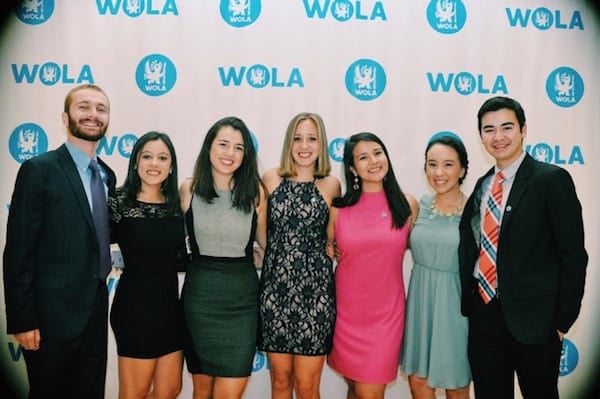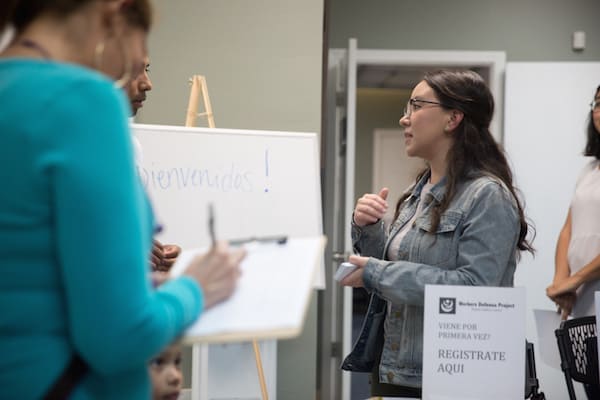Social work senior Sarahi Rojo was selected as an Archer Fellow for the Fall 2016 semester. The Archer Fellowship Program was established by The University of Texas System in conjunction with former U.S. Representative Bill Archer as a way to bring highly motivated and accomplished students to Washington, D.C., for a comprehensive academic and professional experience. Archer Fellows intern full-time in the nation’s capital with an organization that aligns with their professional and academic interests.
We talked with Rojo about her experience as an Archer Fellow last semester, her current internship in Austin at Workers Defense Project, and her plans for the future.
Why did you apply for the Archer Fellowship Program?

I’ve always wanted to study abroad, but when the time came I realized that it was very expensive. And then my lovely School of Social Work advisor, Alexis George, emailed about an Archer Fellowship info session, and it caught my attention. I’ve always been interested in the intersection of policy, advocacy and direct services. At the time I was also taking a course on social work and public policy, which helped me see that we can’t solve core problems without connecting them to the larger picture and to policy-making.
In the info session they were a bit surprised that a social work major was interested in the program. Most of the students that apply to this program are government majors, or political science or international relations majors. So they were intrigued with me because I had a social work background and experience with direct services and grassroots work, but at the same time I wanted to learn about the policy side, and connect both aspects.
What does the fellowship entail?
During the summer we participated in orientation sessions and received hands-on support to apply for internships in D.C. By the time we got to DC in the fall, we had our internships lined up. We were a group of about 40 students from all across the UT System. We lived in groups of eight in each apartment. During the first week, the program really indulged us in D.C. culture: they organized a scavenger hunt for us, we got to know the city, got to know our room mates, learned about the metro…. the metro map can actually be very confusing for first timers! And then we started with our full-time internships. We also met some weekends and evenings for three classes that we took during the semester.
What are these classes?
We had a class on advocacy and another on policy processes. For this one we would meet once a week and have guest speakers such as staffers of former presidents, former government officials, people who worked at national nonprofits, journalists… it was always different and very interesting. And then we had a class that was pretty much about D.C. life. The professor took us all over the city, to the different monuments and museums. It was incredibly special to have class on these sites. We also got to discuss subjects that could be controversial. Going to the new museum of African American history, for example, was interesting because many of us in the group had conflicting views about the election season and what was happening in the country.
Where did you intern?
My field of interest is Latinos in the United States, so I applied for internships that ranged from providing services to the Latino community in D.C. to nonprofits that focused on immigrants and refugees and research-based organizations. In the end, I figured that I could do direct services when I came back to Austin for my last semester in social work. While in DC, I thought it was better to take the opportunity of an internship related to research and policy. I ended up selecting the Washington Office on Latin America, or WOLA, a nonprofit that does advocacy for human rights in Latin America. There were seven interns focusing on different Latin American countries, and I was the Mexico intern.
What did you do there?

It was definitely a semester of learning about and getting immersed in the politics of Mexico and also in how the United States has an effect on it. We also attended meetings at the White House, the State Department, and hosted events with other DC organizations focusing on human rights and Latin America.
I can think of two moments during the internship that had a particular impact on me. One was during election day here in the United States. There was a delegation from Mexico that came to observe polling sites, and I got to learn from them, and them from me. They asked me about my perspective on the election as Mexican-American, and how I thought the results would impact my community here in Texas.
The other moment was when we hosted a delegation of relatives of people who had gone missing in Mexico, due to drug violence or violence in general. WOLA set up meetings for them with government officials and nonprofits so that they could share their story. For me, that was a moment when I saw the social work connection, as we were working directly with the people affected, in this case affected by violence in Mexico.
What would you say about the Archer Fellowship Program to other social work majors?
The program challenges you, makes you see perspectives that you normally would not, and that goes for the classes, your internship, the friends you make… it definitely takes you out of your comfort zone. An interesting thing is that fellows are very diverse in political beliefs. Here at the School of Social Work most of us share similar beliefs. There I met fellows who were at the complete opposite end of the political spectrum from me. Discussions could become really heated, but professors knew how to facilitate constructive conversations. And that makes you refine your thinking and learn how to stand your ground.

I hope that future social work majors consider this program, and consider bringing their passion about specific issues, like education and foster care, into macro level work, into advocacy and policy. Especially in the times we are living now.
You are now in your last semester at UT Austin. Where are you doing your social work internship?
I’m at Workers Defense Project, in the employment and legal services department, and I love it. It is definitely what I wanted to come back to. It’s an interesting time because of the legislative session and the broader political climate. I’m also constantly referring back to my WOLA internship, and connecting the dots between the two. WOLA gave me a broader view about Mexico-U.S. relations, about border issues, and now at Workers Defense it’s all about what this community needs. But as members share that they are from Mexico, or from Central America, I am able to imagine and understand why they might have immigrated to the U.S.
What are your plans for the future?
After I get my bachelor of social work I would like to work for a few years in anything that involves serving the Latino community, especially if it is related to immigration. I want to have that grassroots, local experience and also be involved in advocacy efforts at the Capitol. After that, I foresee coming back to graduate school for a degree in public affairs or public administration. I want a career in public service. I think a social work background and the grassroots experience will give me a firm foundation to have a say in how policy should be written because I was there, and I saw how policy affected communities.
By Andrea Campetella. Posted April 13, 2017.

